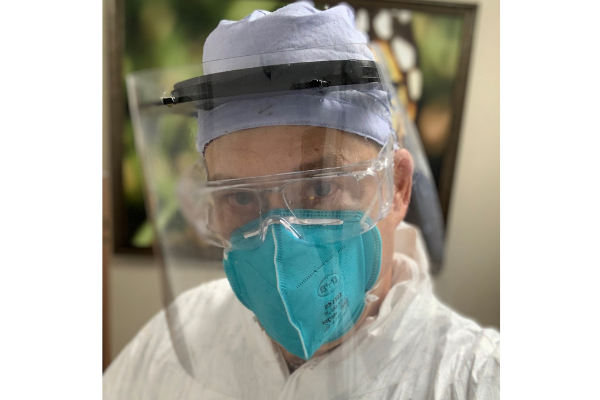
Lubbock pulmonary critical care specialist Victor Test, MD, says he was honored – if surprised – to learn in late January that he had received the American Medical Association Medal of Valor.
Dr. Test’s pandemic accomplishments are legion. He helped source personal protective equipment (PPE) and ventilators for the Texas Tech University Health Sciences Center (TTUHSC), where he teaches and practices; took on extra duties and shifts; and served as a principal investigator in a Mayo Clinic-led study of convalescent serum therapy in COVID-19 patients. But he attributes these successes, at least in part, to his colleagues.
“At the least, receiving the Medal of Valor [means] I can represent all of the physicians and nurses in Texas and around the country who have laid it on the line and deserve recognition, but haven’t gotten it,” he told Texas Medicine Today.
Dr. Test is most proud of the work he did early in the pandemic, when cases were surging on the coasts but had yet to explode in Texas. As a member of CHEST (formerly known as the American College of Chest Physicians), he was part of an information-sharing network. As a result, he started conserving and buying as much PPE as possible. He and his colleagues also worked with bioengineers at TTUHSC to develop face shields and protective chambers, and they spearheaded the development of a health and wellness program for the hospital’s nurses and residents.
“Because of this planning, we had protocols in place before we saw our first patients,” he said.
Once Dr. Test started seeing COVID-19 patients in the medical intensive care unit, he called the patients’ family members each evening with updates. This teamwork – between the physician and the patient’s loved one – is critical for recovery, he says.
“I work pretty hard to try to go through every question a patient’s family might have … and address stuff so we’re working together for the common good of the patient.”
Since the early months of the pandemic, hospital visitation policies have eased, allowing for more face-to-face conversations. He says this has helped families understand the severity of their loved one’s illness as well as the care and compassion the hospital staff provides. It also benefits the patient to hear their loved ones’ voices and feel their touch, even when they’re on a ventilator.
Meanwhile, Dr. Test enrolled more than 100 of his hospital patients in the Mayo Clinic trial, which he describes as a second job. The trial results showed convalescent serum therapy was safe to use but not very effective for patients with severe illness. Although this was disappointing, the trial was part of a broader effort to build up physicians’ toolboxes when treating COVID.
“We’ve added to our armament to help really sick patients, and that’s been a real boost,” he said.
Dr. Test’s colleagues and the broader community recognized his dedication. Throughout the pandemic, his hospital has seen turnover among its nursing staff. But the medical intensive care unit has retained its entire physician roster and most of its core nursing team, along with others, such as respiratory therapists, even as the health care industry faces staffing shortages.
“That’s a real miracle,” he said.
Dr. Test also continues to feel the support of the Lubbock community more than two years into the pandemic. This helps bolster physicians and other hospital staff amid worsening burnout, growing mistrust in medical expertise, and rising anxiety levels as the possibility of a next wave of COVID cases still looms.
Although Dr. Test is quick to deflect praise and share it with his teammates, his personal contributions have stood apart. AMA President Gerald Harmon, MD, described Dr. Test’s efforts as heroic in a Jan. 29 press release.
“Physicians, nurses, residents, and patients witnessed his unflagging kindness, ingenuity, generosity, and caring,” Dr. Harmon said. “He belongs in the pantheon of health care heroes of this pandemic.”
Emma Freer
Associate Editor
(512) 370-1383